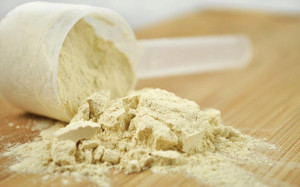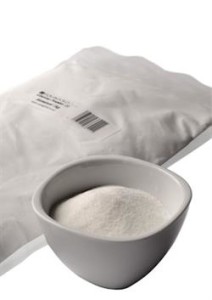
Guide to nutrient selection and nutrient timing
Let me start with a disclaimer: the tips provided on this page and the studies referenced are not necessarily 100% conclusive. The human body is an extremely complex machine and there are so many variables that nutritional science will likely always be a hot topic of debate. However, all nutrients listed are natural compounds that have been known and used for decades if not centuries, and will not do you any harm. Most of them are easy to obtain and relatively cheap, so you can rest assured that I’m not trying to promote any specific brand or product. These are just tips based on research and personal experience, meant to optimize nutrient selection and nutrient timing, which might have beneficial effects on your progress.
Nutrient timing: Best post-workout macronutrients

Whey is an excellent choice as pre- and post-workout protein source
Protein: Obviously your muscles will require amino acids to start rebuilding the damage training caused. Ideally you already have some floating around in your bloodstream from a pre-workout shake or protein-rich meal, but studies show that an intake of 20 grams of protein every three hours (up to four times) after training is better at helping men build lean body mass than eating smaller amounts of protein more often.
Since research has shown contradictory results regarding the most important factor being timing of intake, protein quality, speed of absorption, combination with carbs, my conclusion is that various factors are at work and different people might react differently. What seems to work best for me and is most convenient is to take 20 grams of whey before exercising since it digests easily, another 20 grams after my workout along with a glucose-laden drink, and then have regular meals the rest of the day with at least 20 grams of protein each every 3 hours or so.

Glucose Powder is universally available and dirt cheap.
Carbohydrates: A lot of controversy exists around the topic of whether or not you should combine your post-workout shake with carbohydrates and if so, which kind. Most athletes and most notably bodybuilders seem to agree that it’s best to carbs which rate high on the glycemic index to create an insulin-spike which transports nutrients to your muscle cells which are hungry for nutrients after a workout. Most bodybuilders use pure glucose (a.k.a. dextrose) which is available at most pharmacies or large supermarkets.
Studies do not seem to be conclusive about the benefit of rushing glycogen replenishment. Some argue that over a 24-hour span glycogen stores will be replenished equally as long as carb intake is sufficiently high, regardless of them being absorbed quickly or gradually. Personally, I take the route that seems most logical to me when research is inconclusive, which means I use high-GI carbs just after my workout and more complex carbohydrate sources such as pasta every 3 hours thereafter. I would recommend 25 to 75 grams of sugars depending on the duration and intensity of your workout.
Fat: After working out it’s best to avoid fat since it will slow down absorption of nutrients and as such their delivery to the muscle cells. In fact, it’s best to avoid high-fat meals for about 6 to 8 hours before the gym since you’re going to spike your insulin levels. Considering insulin triggers cells to take up nutrients and you want them to take in carbohydrates for energy and protein for muscle repair, it’s best to avoid too many fatty acids floating around in your bloodstream at that time, since the excess of nutrients and raised insulin levels will cause them to be stored as body fat.
Nutrient timing: Best post-workout micronutrients
β-alanine: According to the double-blind, placebo-controlled study study “Effects of β-alanine supplementation on performance and body composition in collegiate wrestlers and football players“, previously trained wrestlers taking 4 grams of β-alanine daily gained nearly twice as much lean muscle mass as the placebo group. More research is required since results were not statistically significant, but β-Alanine appears to augment performance and promote lean muscle mass in only 8 weeks.
Creatine: This is one of the few supplements that has conclusively been proven to improve resistance training performance by increasing the formation of ATP. Although the human body can synthesize creatine, supplementation significantly increases the levels of creatine stored in muscle tissue. In 2004 the European Food Safety Authority (EFSA) stated that long-term supplementation of 3g creatine per day does not pose any health concerns. Extensive research has indicated that creatine supplementation up to 20 grams per day appears to be very safe and largely devoid of adverse side-effects. You should also know that caffeine might undo the positive effects of creatine to some extent, even though both are common ingredients in commercial pre-workout products.
Electrolytes: When this term is used in context of nutrition, one is usually referring to potassium and sodium. These minerals are commonly found in fruits and vegetables, notably coconut water has high quantities of potassium and makes an excellent natural sports drink. Commercial sports drinks usually combine electrolytes with sugars to promote absorption. I would recommend to check the label on these drinks to make sure that the sugar used is glucose rather than high-fructose corn syrup since fructose needs to be broken down by the liver whereas glucose can be oxidized directly.
Fenugreek: This is a plant commonly used in Indian dishes. A study performed in 2011 at the Australian Centre for Integrative Clinical and Molecular Medicine concluded that men between the ages of 25 and 52 taking the extract twice daily for a total of six week scored 25% higher on tests meant to gauge libido in comparison to a placebo. This seems to indicate that fenugreek is somehow promoting testosterone levels. Scientists aren’t sure why fenugreek seems to have this effect on men, but one possible explanation is that the herb’s seeds contain saponins, which affect hormone levels. One particular saponin, called diosgenin, could affect production of sex hormones. According to another study “Therapeutic Applications of Fenugreek” there might be further benefits to supplementation such as ower serum trig- lycerides, total cholesterol (TC), and low-density lipoprotein cholesterol (LDL-C).
Curcumin: Although clinical trials are underway to study the effects of this compound, at this time there is not enough data to confirm its effects
This post is also available in: Spanish
